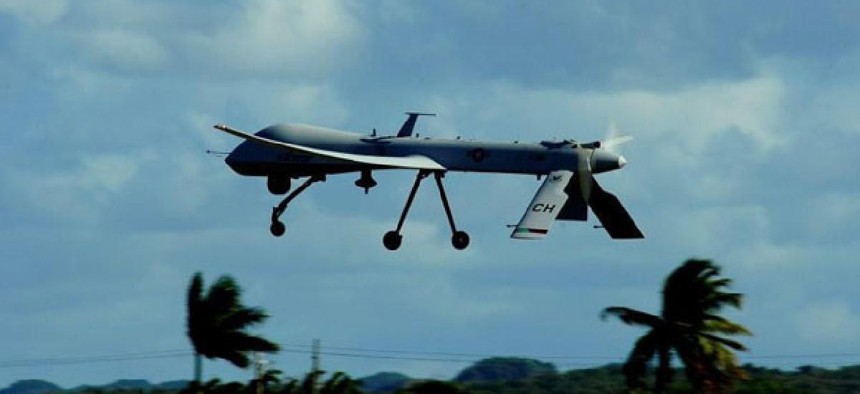White House should develop rules for drone program, insiders say

United States Air Force
Most National Journal security experts say the rules should be kept secret.
A strong 87 percent majority of National Journal's National Security Insiders say that the White House should develop formal rules for the drone program targeting terrorists overseas.
But 58 percent of Insiders believe that those rules should be kept secret. "Drones have introduced a new element into warfare. Along with other related developments, the established international rules of war have been overtaken and need new agreed definition, principles, and interpretation," one Insider said, calling for those rules to be kept secret because the U.S. should not "prematurely" define its policy.
"We cannot just wing it with the drone program, but we should not allow terrorists to know when, where, how, and if they will be targeted," another Insider said. "Some things need to remain classified; this is one of them."
Others called for clearly delineated rules of engagement for the drone strikes, especially because more countries will have this technology shortly—but they said that specific operational details should remain secret. "Rules of engagement are absolutely vital to the use of any new weapons system. Drones represent a major leap in the means available to the Defense Department just as nuclear weapons did when they came into the system," one Insider said. "Drones don't have the destructive power of a nuclear weapon, but they should not be considered just 'another air platform.' "
One Insider said that the rules should be kept secret, except for provisions outlining protections for American citizens suspected of being terrorists who might be targeted abroad—such as Yemen-based cleric Anwar al-Awlaki, who was killed in 2011 along with another American, Samir Khan, who produced a magazine promoting terrorism but was reportedly not on a specific kill list. "What is the process for allowing the targeted killing of Americans? It is unbelievable that this president is getting away with killing Americans," one Insider said. "Imagine what would have been done to Bush!"
A 13 percent faction said that it was not necessary for the White House to develop formal rules for the program. "They need flexibility," one Insider said. "Having the National Security Council and attorney general review is sufficient."
With Defense Secretary Leon Panetta leaving office, perhaps as early as this week if his would-be successor Chuck Hagel is confirmed, a plurality of 47.5 percent of Insiders say he will be best remembered for diversity issues in the force, such as implementing the repeal of the "don't ask, don't tell" policy to allow gays to serve openly, and paving the path for women to service in more combat positions.
"In many ways, Secretary Panetta's legacy was enabling the reelection of the president, in part because he persuaded the service chiefs to accept the first tranche of Budget Control Act cuts with no public complaints and in part because he managed the drawdowns in Iraq and Afghanistan," one Insider said."Those won't be what he is remembered for; his action to open combat to women will be the defining legacy we'll remember 40 years from now."
Panetta held the line on spending as best he could, one Insider said. "The drawdowns were mandated by the White House. But had he chosen to do so, he could have left office without pushing for more social change in the military. He chose to do so and will be remembered for it."
A 27 percent faction said that overseeing the drawdown of troops in Iraq and Afghanistan will be his legacy. "Being able to set withdrawal dates is historical," one Insider said. But 17 percent of Insiders said that Panetta will be remembered for other reasons—namely, that he did not have a defining issue to make his mark. Insiders called him a "placeholder for Obama policies" and "continuity [after] the departure of Bob Gates."
Panetta will be remembered, one said, "as a caretaker, a good servant. But nothing more."
Read details of the survey results at National Journal.
--
NEXT STORY: Dell going private for $24.4 billion






